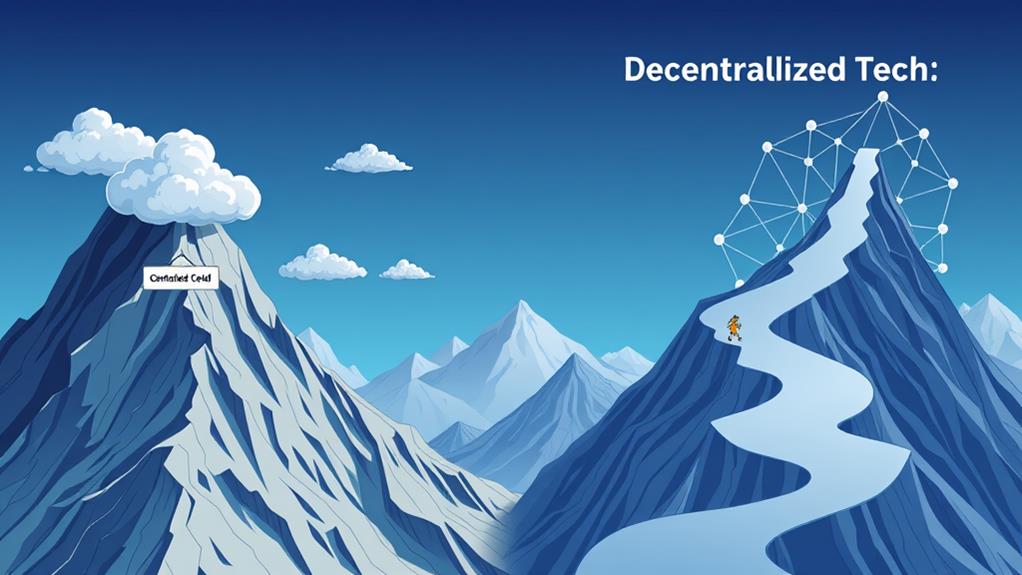
Centralized cloud computing presents a substantial barrier for startups. Dominated by a few corporations, it imposes high entry costs and stringent gatekeeping. These factors stifle innovation and limit market access for smaller entities. Additionally, the ongoing financial burden of maintenance and the complexity of regulatory compliance add to these challenges. Alternatively, decentralized technologies offer promising solutions by drastically reducing operational costs and promoting data sovereignty. This shift could democratize access to cloud resources, fostering a more equitable tech landscape. Explore how decentralized models are reshaping the industry and lowering barriers for innovative startups.
Table of Contents
Centralized Cloud Computing

Dominating the current digital landscape, centralized cloud computing is characterized by its consolidation under a few major corporations with extensive control over global data and computational resources. This centralization promises robust cloud security and infrastructure scalability, ensuring consistent performance and protection against cyber threats. However, for freedom-seeking innovators, the dominance of these corporations imposes restrictive barriers. The need to navigate stringent gatekeeping mechanisms stifles independent growth and innovation. Additionally, significant capital investment is necessary to leverage these centralized resources, creating an uneven playing field. As the demand for autonomous and scalable solutions rises, the limitations of centralized cloud computing become increasingly evident, prompting a shift towards more inclusive and decentralized alternatives.
Startup Challenges
For startups, breaking into the centralized cloud computing market can be a formidable task due to several inherent challenges. High entry costs are a significant hurdle, often requiring substantial funding options that small startups find difficult to secure. Furthermore, the stringent gatekeeping mechanisms imposed by dominant corporations limit market access, stifling innovation and growth. Connectivity issues, especially in regions with inconsistent Internet access, further complicate operations. Additionally, restrictive data sovereignty policies hinder the ability to freely manage and store data, while ongoing maintenance expenses can drain financial resources. These barriers collectively constrain startups, preventing them from achieving the autonomy and scalability necessary to thrive in a competitive landscape dominated by a few powerful players.
Decentralized Technology Benefits

Decentralized technologies offer a multitude of benefits that address many of the challenges faced by startups in the centralized cloud computing model. By leveraging decentralized networks, startups can drastically lower costs, eliminating the need for expensive server infrastructure. This peer-to-peer model enhances connectivity, ensuring operations remain uninterrupted even in regions with inconsistent Internet access. Additionally, decentralized technologies empower startups with true data ownership, allowing for local data storage that enhances security and autonomy. This shift not only facilitates regulatory compliance by adhering to local laws but also provides a scalable infrastructure that grows with the business. Ultimately, decentralized networks champion the freedom and flexibility necessary for startups to innovate and thrive without the constraints of traditional centralized systems.
Real-World Use Cases
Several compelling real-world use cases illustrate the transformative potential of decentralized technologies, particularly in regions with limited access to traditional centralized cloud infrastructure. For example, localized blockchain applications in Africa and Latin America have revolutionized agricultural supply chains, offering unparalleled transparency and empowering small farmers with fairer market access. Peer-to-peer networks have similarly facilitated essential services in areas plagued by low connectivity, ensuring that communities remain connected and resilient. Innovation hubs leveraging decentralized solutions foster collaboration, enabling resource sharing and collective problem-solving. These examples underscore how decentralized technologies not only lower costs but also enhance data autonomy and regulatory compliance, ultimately driving economic growth and fostering a more inclusive tech ecosystem.
Future Prospects

Looking ahead, the future prospects for decentralized technologies are promising and poised to reshape the tech ecosystem fundamentally. Decentralized finance and technological empowerment offer a transformative paradigm shift, enabling startups to thrive without being hindered by centralized constraints.
| Aspect | Current State | Future Prospects |
|---|---|---|
| Entry Costs | High and prohibitive | Lowered through decentralized finance |
| Data Control | Restricted by centralization | Enhanced through local data sovereignty |
| Innovation Capacity | Stifled by gatekeeping | Expanded via technological empowerment |
These advancements promise a more inclusive and equitable landscape, fostering innovation and economic growth. With global support, decentralized technologies can dismantle existing barriers, democratizing access and enabling a freer, more open tech ecosystem.
Conclusion
The monopolistic stronghold of centralized cloud computing suffocates innovation, erecting insurmountable barriers for startups and stifling the technological ecosystem. In stark contrast, decentralized technologies emerge as a panacea, offering dramatically lower operational costs, unparalleled connectivity, and unassailable data sovereignty. By embracing decentralized models, the landscape can be revolutionized, releasing unprecedented opportunities and fostering a more inclusive, dynamic future. The potential for transformation is not just significant; it is colossal, heralding a new era of technological democratization.







